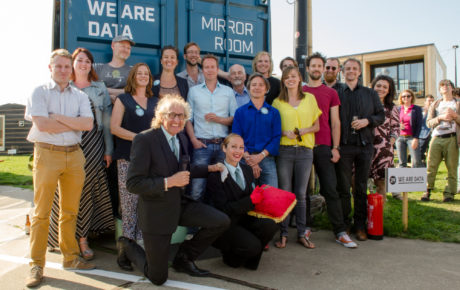WE ARE DATA
YOU SHOULD EXPERIENCE IT
In the public debate the generation and storage of personal information (data) and associated questions about security and privacy play an increasingly important role. This subject will only gain importance in the near future, as we make technological advances in collecting personal data and using it.
During the Masterclass Sandberg/Media Fund in 2014, documentarian Thomas Blom and designer Tijl Akkermans researched the theme of 'Quantified Reality’. They realised that while we can hardly influence this development of technical innovation, we can make a contribution by creating more awareness about it. To do this we make the abstract discussion about data and privacy more concrete. The MIRROR ROOM will make the subject of data and privacy tangible by confronting people with their own personal information.
WE ARE DATA aims to go beyond what other similar projects are doing. When it comes to ‘Big Data’, the sharing and storing of personal information via Facebook, Instagram, Twitter and other Social Media platforms is a hot topic. But these particular actions are conscious. We knowingly place a photo online, or comment on something. The experience in the MIRROR ROOM focuses on physical and emotional information that you – as a person – are always sharing, whether you like it or not, or know it or not. We are data.
“In collaboration with WE ARE DATA the VPRO explores new ways to discuss data and privacy in such a way that it invites a wide audience to think about privacy on a very personal level: what does it mean to the individual, and what value does their privacy represent?”
VPRO, mediapartner of WE ARE DATA
WE ARE DATA is not an indictment or a political statement. We want to create awareness on a very personal and individual level, because most people are far removed from all this. Privacy is an abstract and diffuse topic that most of us gladly leave to politicians and policy-makers. The MIRROR ROOM makes the subject tangible and gives people a conscious-action perspective. We focus specifically on various target groups: young people at festivals, diverse populations in the public space (train stations, city squares), but also well-informed audiences at conferences and policy events.
Technical innovations are developing so rapidly. Soon computers and machines will be able to read the emotions of another person better than a human can. This development will definitely influence our world and our environments. Technology can help us track people and feel ‘safer’, but the flip side of that is that we will always be monitored, and analysed - we will not even be able to hide our deeper thoughts and emotions. Technology can and will make us transparent. Something we should all think about…

